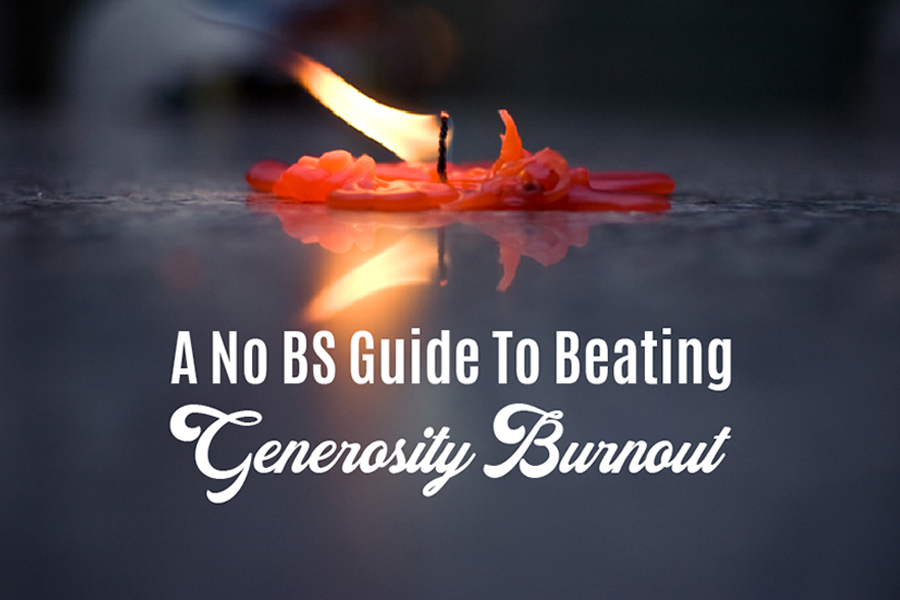The holiday season is fast approaching. Do you feel the rush of excitement from gift-buying suggestions, travel planning, and an increased communication among your family members?
I get giddy from sparkly lights that illuminate long, dark nights. I reminisce over cheesy holiday music. I cleanse my brain by breathing in cold air loaded with the sharp, green smell of spruce. I feel hopeful seeing holiday-themed gratitude quotes that are passed around over social media...
Instantly, this season puts many of us in a generous, giving mood. It's simply contagious.
But then...what goes up, must come down. Ying and Yang. I sense a fuzzy dark cloud forming and it’s coming my way. Every so often I come down from a holiday hype high, and I don’t feel well at all. What’s really going on there?
Dissecting the Feeling of “Generosity Burnout”
When I saw this title from the podcast episode on HBR IdeaCast, I felt like I just found a long-lost love.
For a while now, I have been searching for the term to describe the feeling underlining everything else was happening in my life. If you are interested in reading the original article by Adam Grant, the author of “Give and Take,” and Reb Rebele, click here. While the article mainly discusses this concept in a larger organizational setting, it is also applicable to a smaller, entrepreneurial ecosystem.
The sad fact is I'm not even remotely generous compared to many others around me. This makes me hesitant to openly admit that I feel drained from the giving holiday spirit.
According to the article, I sit somewhere within “Self-Protective Givers” area of the spectrum. In other words, I am selective in terms of what I say ‘yes’ to. Yet there I was, sensing the feeling of "generosity burnout" peeking just around the corner. I just didn't know how to explain the feeling.
It's different from being depressed or sad. It is closer to something like "my store shelves are empty because I just got robbed" feeling. I simply don't have any more to give.
The reason I am not specifically saying, I feel like "my well has dried up" or "my cup is empty" because I actually feel robbed. It didn't gradually dry up. The loss is great and it happens so fast, blink and you’ll miss it. I keenly feel the void.
When I am giving continuously, yet I feel rushed with everything else I need to achieve, my voice says, "Maiko, what are you doing with your energy and time?!"
This is a tricky subject, I realize. No one wants to admit they feel burned out from being generous because they worry admitting it would make them look bad.
Why?
No one wants to give an impression that he or she is keeping score or expecting something in return.
No one wants others to be confused and believe that he has a scarcity mindset.
Here’s the fact: None of us who experience generosity burnout, are keeping score or expecting something in return. We take our pride in being a serving leader. So, why do we feel so drained?
The truth is that generosity burnout doesn’t just happen during holiday seasons; it can happen at any given moment. I'm hoping this is something that resonates with you. My goal here isn't to vent. In fact, my goal is opposite: I want to find ways to keep giving values that can be helpful to others without burning out.
3 Types of People to Avoid
I learned that, most of the time, I do have an infinite amount of insights, resources, and tools to willingly give to others. The energy does not keep draining because I get it back in my system from those who are appreciative. Seeing their faces with deep appreciation and excitement makes me want to do more, outdo my previous attempt, and keep the momentum with non-stop wowing.
I am not being pretentious. I do like helping and referring others. It is my way of checking how professionally resourceful I am. If there are favors that I cannot undertake, that would be a sign that I need to up my game with my network.
It seems the burnout only happens when my effort and energy get sucked into a blackhole, with no results being reported back or no response from the recipients.
The HBR article lists 4 types of “givers” that cover all spectrum from giving none to giving one’s all. I have my own list of the ones to avoid dealing with altogether:
1. Energy Vampires
2. Opportunists
3. Oblivious & Clueless
Energy Vampires
The definition of “energy vampires” is outlined in the blog post, “How to Avoid Being Drained by Energy Vampires” by Sophie Henshaw in PsychCentral.
“Energy vampires are emotionally immature individuals who have the sense that the whole world revolves around them. They are almost incapable of seeing things from another person’s perspective. They often lack empathy. They believe that they must take everything they can get from others and that giving anything will deprive them of essential resources. It’s as if the whole world exists just to serve them and you are the latest object upon which they have set their sights for exploitation.”
They are charming, social, and love attention. Most importantly, they don’t think twice about asking for favors, as if people are supposed to rush over to help them. Hence the saying, “Give him an inch, he takes a mile.” With energy vampires, it is all about them and no one else.
Opportunists
Opportunists are different from energy vampires. They are laser-focused on what they want, and how to advance their own agenda. They do the math in their head and are generally very calculating. The only time they may return favors is when they feel that it is absolutely necessary to get what they want. Otherwise, they would intentionally withhold their resources.
When it is pointed out by others they never came through with their promises, they may say that they forgot, and it completely went over their head. In reality, though, they did not forget; they weren’t going to come through from the beginning, if they could get away with it.
The difference between Energy Vampires and Opportunists are that Opportunists have a clear intent and are quite strategic. On the other hand, Energy Vampires simply do not care what happens to others.
Although an arrangement with Opportunists can work out to be a fair deal, I personally avoid them as I value my time more, and don’t feel like negotiating.
Oblivious & Clueless
Unlike the Opportunist, Oblivious & Clueless type do not calculate anything.
Simply put, they unknowingly lack consideration for others. Most people who fit in this category do not have any malicious intent to hurt others. They are just too preoccupied with themselves, and they are not even aware that this is the reason people leave them.
Selfish, yes, but just mildly.
Another trait is that they don’t make it easier for others to help. They tend to be on the lazy and fuzzy side when it comes to articulating what they need or what they want. Also, they behave helplessly and put no effort into resolving the issue themselves. However, they are not shy to ask for help.
Their lives are chaotic, and they are less inclined to make any commitment as they want to wait for something better to come along, even if they are the one asking for your time. The concept of “self-check” is not in their book.
In some cases, they have no intention of resolving their issues. Either they want to be heard, or they want others to do the job for them at no cost to them. One commonality between Oblivious & Clueless and Energy Vampires is that they will both make you feel guilty if you don’t help them. Opportunists will just move on to the next target.
"Show Up" Like a True Entrepreneur:
Master How to Work ON (Not IN) Your Business
Gain an access to get your FREE assessment.
(Plus special bonus materials.)
Actually, I Take It Back; I DO Want Something in Return.
Which of the above do you think is the worst? The answer depends on your personality. You may be way more giving than I am. You may be a people-pleaser, while I am not. You may be emotionally reactive, while I tend to sit back and observe.
As for me, the worst type is Oblivious & Clueless.
Energy Vampires and Opportunists are much, much easier to spot. I am so good at detecting it, I spend no time with these types of people. Therefore, they are not the cause of my burnout.
On the other hand, Oblivious & Clueless types are harder to spot. Sometimes, this type is undetectable if they are only an acquaintance. On the outside, they are pretty decent people. You will only start to recognize this type when you do a project together or work with them as a team.
As you can imagine, it’s difficult to pull out once you commit to doing something together. This is the point when stress and annoyance start to mount inside of me. After observing myself closely, I learned that this is the start of my generosity burnout.
“Don’t ask for anything in return” is such a bullshit advice.
I DO WANT SOMETHING IN RETURN. OK?
There, I said it. My gosh, I feel so much better!
Here is what I want:
1. A quick update on how my introduction to someone helped you.
2. Tell me you actually implemented my advice, not telling me 100s of reasons why not.
3. Letting me know your true feedback on something I offered.
4. Your happy dance or a simple thank you.
Is that too much to ask? I don’t think so.
I think we all are expecting our positive energy to be returned. When our outgoing energy only goes one way, naturally, our energy gets deprived. That is why I feel like I’m getting robbed when I give non-stop.
Other Factors to Consider While You Assess Your Case of Burnout.
If I only focused on personality types to figure out how to avoid getting into burnout, it would be one-sided. I have gone through the below. As a result, it turned out that personality types had a lot to do with me. However, this may not be your case.
So, let’s go over other factors you should consider while you do your own assessment.
Type of Asks:
1. Introduction to someone in your network,
2. Finding them a job,
3. Help them with their work.
4. Providing your expertise for free.
5. Permission to use your platform or your contact list for promotion.
Level of Inquirer:
1. Peers
2. New to the scene / Subordinates / Students from your school
3. Favors from someone above you
4. Family and friends
5. Complete strangers
Level of Asks:
1. Easy,
2. Easy but time-consuming,
3. Fast,
4. Fast, but labor-intensive,
5. Complex, time-consuming, and labor-intensive.
In my case, none of these mattered enough to cause burnout. But again, my case is probably different from yours. Understanding the root cause of your generosity burnout by using the above as a checklist can help you pinpoint the signs you should look out for.
The Ultimate Generosity Burnout Buster
Prevention and avoidance are not the only way to protect ourselves from generosity burnout.
Ultimately, continuously building a strong network around you with people who share the same values would reduce the amount of nonsense that comes your way. It would be more likely that these people will be as generous as you are, and will happily return your favor as you grow together.
There is this adage, “Your net worth is your network.”
While you continue nurturing your existing network, your eye should be focused on finding new people you are inspired by, and resonate with. If you find that your burnout comes from your network, then you need to reassess and revamp your network.
Lastly, as we get older and our professional role becomes more elevated, the phrase Noblesse Oblige, will come in to play. It is expected for us to fulfill larger social responsibilities. This will make things more complicated, as you may be approached by institutions and organizations that are outside of your network.
They may find you from a conference you spoke at, or a social media platform. It can be hard to be selective for “good causes” without feeling bad about saying “no.”
When you face a situation like this, you just have to remember 2 things:
1. You can’t make everyone happy,
2. If you are burned out, you can’t help others. So, you need to take care of yourself.
I wish all of you a wonderful, stress-free holiday season, where you get to enjoy your company, reflect on your big and small wins this year, and rest up for the new coming year!




